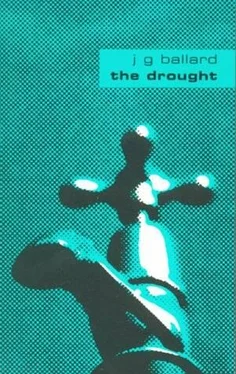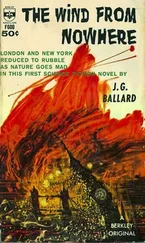
(First published in 1964)
Chapter 1 – The Draining Lake
At noon, when Dr. Charles Ransom moored his houseboat in the entrance to the river, he saw Quilter, the idiot son of the old woman who lived in the ramshackle barge outside the yacht basin, standing on a spur of exposed rock on the opposite bank and smiling at the dead birds floating in the water below his feet. The reflection of his swollen head swam like a deformed nimbus among the limp plumage. The caking mudbank was speckled with pieces of paper and driftwood, and to Ransom the dreamfaced figure of Quilter resembled a demented faun strewing himself with leaves as he mourned for the lost spirit of the river.
Ransom secured the bow and stern lines to the jetty, deciding that the comparison was perhaps less than apt. Although Quilter spent as much time watching the river as Ransom or anyone else, his motives would be typically perverse. The continued fall of the river, sustained through the spring and summer drought, gave him a kind of warped pleasure, even if he and his mother had been the first to suffer. Their derelict barge-an eccentric gift from Quilter's protector, Richard Foster Lomax, the architect who was Ransom's neighbor-had now taken on a thirty-degree list, and a further fall of even a foot in the level of the water would split its hull like a desiccated pumpkin.
Shielding his eyes from the sunlight, Ransom surveyed the silent banks of the river as they wound westwards to the city of Mount Royal five miles away. He had spent the previous week alone on what was left of Lake Constant, sailing the houseboat among the draining creeks and mudflats as he waited for the evacuation of the city to end. After the closure of the hospital at Mount Royal he had intended to leave for the coast, but at the last moment decided to give himself a few final days on the lake before it vanished for good. Now and then, between the humps of damp mud, he had seen the distant span of the motorbridge across the river, the windows of thousands of cars and trucks flashing like jeweled lances as they set off along the coast road to the south.
Ransom postponed his return until all movement along the bridge had ended. By this time the lake, once a clear stretch of open water thirty miles in length, had subsided into a series of small pools and channels, separated by the banks of draining mud. A few last fishing craft sailed forlornly among them, their crews standing silently in the bows.
By contrast, something about the slow transformation exhilarated Ransom. As the wide sheets of water contracted, first into shallow lagoons and then into a maze of narrow creeks, the wet dunes of the lakebed seemed to emerge from another dimension. On the last morning he woke to find the houseboat beached at the end of a small cove. The slopes of mud, covered with the bodies of dead birds and fish, stretched above him like the shores of a dream.
As he approached the entrance to the river, steering the houseboat among the stranded yachts and fishing boats, the lakeside town of Larchmont was deserted. Along the fishermen's quays the boathouses were empty, and the drying fish hung in the shadows from the lines of hooks. A few refuse fires smouldered in the waterfront gardens, their smoke drifting past the open windows that swung in the warm air. Nothing moved in the streets. Ransom had assumed that a few people would remain behind, waiting until the main exodus to the coast was over, but Quilter's presence, like his ambiguous smile, in some way seemed an obscure omen, one of the many irrational signs that had revealed the real progress of the drought during the confusion of the past months.
A hundred yards to his right, beyond the concrete pillars of the motorbridge, was the fuel depot, the wooden piles of the wharf clearly visible above the cracked mud. The floating pier had touched bottom, and the flotilla of fishing boats usually moored against it had moved off into the center of the channel. Normally, at late summer, the river would have been almost three hundred feet wide, but it was now less than half this, an evil-smelling creek that wound its way along the flat gutter of the banks. The caking mud was firm enough to support a man's weight, and a series of gangways led down to the water's edge from the riverside villas.
Next to the fuel depot was the yacht basin, with the Quilters' barge moored against its boom. After signing the vessel over to them at the depot, Lomax had added a single gallon of diesel oil in a quixotic gesture of generosity, barely enough fuel for the couple to navigate the fifty yards to the basin. Refused entry, they had taken up their mooring outside. Here Mrs. Quilter sat all day on the hatchway, her faded red hair blown about her black shawl, muttering at the people going down to the water's edge with their buckets.
Ransom could see her now, beaked nose flashing to left and right like an irritable parrot's, flicking at her dark face with an old Chinese fan, indifferent to the heat and the river's stench. She had been sitting in the same place when he set off in the houseboat, her ribald shouts egging on the group of weekend mariners laying a line of cement-filled bags across the entrance to the yacht basin. Even at flood barely enough water entered the circular harbor to irrigate its narrow docks, and this had now leaked back into the river, settling the smartly decked craft firmly into their own mud. Deserted by their owners, the yachts were presided over by Mrs. Quilter's witchlike presence.
Despite her grotesque appearance, and insane son, Ransom liked and admired her. Often during the winter he crossed the rotting gangway into the gloomy interior of the barge, where she lay in a huge feather mattress tied to the chart table, wheezing painfully to herself. The single cabin, filled with dusty brass lanterns, was a maze of filthy recesses veiled by old lace shawls. After treating her from the flask of gin in his valise, Ransom would receive in turn a rambling disquisition on the evils of the world at large, and then be rowed back across the river in her son's leaking coracle, Quilter's great eyes below the hydrocephalic forehead staring at him through the rain like wild moons.
Rain!-At the recollection of what the term had once meant, Ransom looked up at the brilliant sky. Unmasked by clouds or vapor, the sun hung over his head like an inferno. The cracked fields and roads adjoining the river were covered with the same unvarying light, a glazed motionless canopy that embalmed everything in its heat.
Beside the jetty Ransom had staked a series of colored poles into the water, but the rapid fall in the level was too obvious to need calculation. In the previous three months the river had dropped some twenty feet. Ransom estimated that it had shrunk to less than a quarter of its original volume. As it sank into the center of the narrow gulley, it seemed to pull everything toward it, and the two banks were like the faces of opposing cliffs. This was helped by the inverted tents suspended from the chimneys of many of the riverside houses. Originally designed as raintraps-though no rain had ever fallen into them-the canvas envelopes had been transformed into a line of aerial garbage scoops, the dust and litter raised like expiatory offerings to the sun.
Ransom crossed the deck and stepped down into the steering well. He waved to Quilter, who was watching him with a drifting smile. Behind him, along the deserted wharfs, the bodies of the fish, hanging from their hooks in the drying sheds, turned slowly in the air.
"Tell your mother to move the barge," Ransom called across the interval of slack water. "The river is still falling."
Читать дальше
Конец ознакомительного отрывка
Купить книгу









